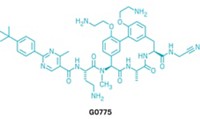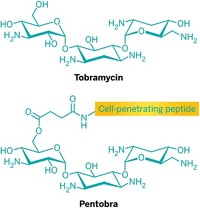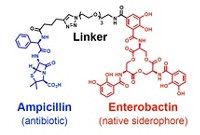Advertisement
Grab your lab coat. Let's get started
Welcome!
Welcome!
Create an account below to get 6 C&EN articles per month, receive newsletters and more - all free.
It seems this is your first time logging in online. Please enter the following information to continue.
As an ACS member you automatically get access to this site. All we need is few more details to create your reading experience.
Not you? Sign in with a different account.
Not you? Sign in with a different account.
ERROR 1
ERROR 1
ERROR 2
ERROR 2
ERROR 2
ERROR 2
ERROR 2
Password and Confirm password must match.
If you have an ACS member number, please enter it here so we can link this account to your membership. (optional)
ERROR 2
ACS values your privacy. By submitting your information, you are gaining access to C&EN and subscribing to our weekly newsletter. We use the information you provide to make your reading experience better, and we will never sell your data to third party members.
Biological Chemistry
Anti-Infective Spurs Natural Defenses
Peptide protects mice against bacterial infection by altering their innate immune response
by Celia Henry Arnaud
March 28, 2007

A new anti-infective peptide helps mice ward off a wide range of bacteria in a roundabout way.
The synthetic peptide, called IDR-1 for innate defense regulator, doesn't target the bacteria directly. Instead, it alters the natural immune response in mice and protects them from a variety of bacteria, including some of the "superbugs" such as methicillin-resistant Staphylococcus aureus and vancomycin-resistant enterococci that cause infections in hospitals (Nat. Biotechnol., DOI: 10.1038/nbt1288). Because it doesn't act directly on the bacteria, the peptide may not cause bacterial resistance.
Researchers at the University of British Columbia and Inimex Pharmaceuticals, both in Vancouver, started with natural peptides that are known to modulate the immune system but are also toxic and stripped them down to eliminate the toxic effects. IDR-1 protects mice from bacterial infection whether it is administered before or after infection, says microbiology professor Robert E. W. Hancock, who led the research. The peptide appears to recruit and activate monocytes and macrophages, which are immune cells that eliminate bacteria. Also a key part of the protective mechanism is the suppression of proteins that trigger inflammation, including tumor necrosis factor α and interleukin-6.
The work is a "major breakthrough in anti-infective agent research," says William M. Shafer, a microbiologist at Emory University School of Medicine. "Although I have become somewhat jaded over the years regarding anti-infective research programs that show initial promise with a particular compound, I am cautiously optimistic about the future success of IDR-1."
Immunologist Michael A. Zasloff of Georgetown University isn't so sure. "There is no clear target, and the mechanism of action is not clear," he says. "As a consequence, it becomes difficult if not impossible to transfer the technology to man."





Join the conversation
Contact the reporter
Submit a Letter to the Editor for publication
Engage with us on Twitter